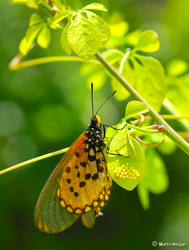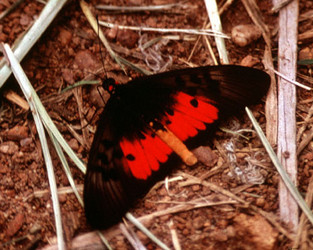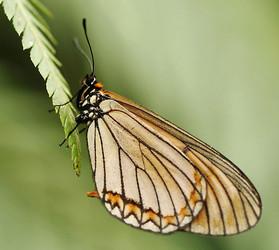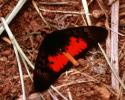Acraea
Andrew V. Z. Brower


This tree diagram shows the relationships between several groups of organisms.
The root of the current tree connects the organisms featured in this tree to their containing group and the rest of the Tree of Life. The basal branching point in the tree represents the ancestor of the other groups in the tree. This ancestor diversified over time into several descendent subgroups, which are represented as internal nodes and terminal taxa to the right.

You can click on the root to travel down the Tree of Life all the way to the root of all Life, and you can click on the names of descendent subgroups to travel up the Tree of Life all the way to individual species.
For more information on ToL tree formatting, please see Interpreting the Tree or Classification. To learn more about phylogenetic trees, please visit our Phylogenetic Biology pages.
close boxIntroduction
The large genus Acraea ranges from Africa to Australia. However, only five species occur outside of Africa and Madagascar. Many Acraea species serve as models for various Batesian mimics.

2005.250a.jpg)
Acraea caldarena larva from Mt. Mulanje, Malawi. © 2008 Bernaud Dominique
Discussion of Phylogenetic Relationships
The cladogram and composition of species groups shown is based on the phylogenetic analysis of morphological characters by Pierre (1987). The tree produced by Silva-Brandão et al. (2008) is quite incongruent with this topology, but may not include sufficient samples of the very diverse African fauna to provide reliable resolution. Nevertheless, there is strong indication in the latter data set that Acraea is paraphyletic with respect to Actinote.
The taxa included in Bematistes appear as a monophyletic group nested inside Acraea in both Pierre's tree and the Silva-Brandão et al. analysis, and may warrant recognition as a distinct genus once the relationships among the remainder of the clade are clarified. The name Miyana applies to southeast Asian species (A. moluccana, A. violae and A. meyeri) that are also nested within a subgroup of African Acraea.
An alternative scheme of relationships apparently quite different from Pierre's is implied by the classification of Henning (1992-93).
Other Names for Acraea
- Telchinia
- Solenites
- Phanopeltis
- Aphanopeltis
- Miyana
- Bematistes
- Rubraea
- Stephenia
References
Ackery PR, Smith CR, and Vane-Wright RI eds. 1995. Carcasson's African butterflies. Canberra: CSIRO.
Larsen, T. B. 1991 Butterflies of Kenya and their natual history. Oxford: Oxford University Press.
Larsen, T. B. 2005 Butterflies of West Africa. Stenstrup, Denmark: Apollo Books.
Henning, G. A. 1992-1993 Phylogenetic notes on the African speceis of the subfamily Acraeinae. Parts 1 - 3. Metamorphosis, 3(3):100-104; 4(1):5-18; 4(2):53-68.
Parsons M. 1999. The butterflies of Papua New Guinea: their systematics and biology. Academic Press, San Diego.
Pierre, J. 1987 Systématique cladistique chez les Acraea (Lepidoptera, Nymphalidae). Annls. Soc. Ent. Fr. (N. S.) 23, 11-27.
Silva-Brandao, K. L., Wahlberg, N., Francini, R. B., Azeredo-Espin, A. M. L., Brown, K. S. J., Paluch, M., Lees, D. C. & Freitas, A. V. L. 2008 Phylogenetic relationships of butterflies of the tribe Acraeini (Lepidoptera, Nymphalidae, Heliconiinae) and the evolution of host plant use. Molecular Phylogenetics and Evolution 46, 515-531.
Information on the Internet
- Le site des Acraea de Dominique Bernaud. This website, compiled by Dominique Bernaud, contains an enormous amount of taxonomic, biogeographical and life-history information, as well as original descriptions and photos of African Acraeini.
Title Illustrations

| Scientific Name |
Acraea horta Passifloraceae |
|---|---|
| Location | South Africa |
| Specimen Condition | Live Specimen |
| Identified By | Andrew V. Z. Brower |
| Behavior | ovipositing on Adenia fruticosa |
| Sex | Female |
| Life Cycle Stage | adult |
| View | ventral |
| Source | Butterfly laying eggs |
| Source Collection | Flickr |
| Image Use |
 This media file is licensed under the Creative Commons Attribution-NonCommercial-NoDerivs License - Version 2.0. This media file is licensed under the Creative Commons Attribution-NonCommercial-NoDerivs License - Version 2.0.
|
| Copyright | © 2006 Martin Heigan |
| Scientific Name | Acraea perenna |
|---|---|
| Location | Gombe National Park, Tanzania |
| Specimen Condition | Live Specimen |
| Identified By | self |
| Behavior | "puddling", i.e. drinking from wet soil |
| Sex | Male |
| Life Cycle Stage | Adult |
| View | Dorsal |
| Copyright |
© 2005
David Bygott

|
| Scientific Name | Acraea issoria formosana |
|---|---|
| Location | Taiwan |
| Specimen Condition | Live Specimen |
| Source | growing up_3 |
| Source Collection | Flickr |
| Image Use |
 This media file is licensed under the Creative Commons Attribution-NonCommercial-NoDerivs License - Version 2.0. This media file is licensed under the Creative Commons Attribution-NonCommercial-NoDerivs License - Version 2.0.
|
| Copyright | © 2005 leemt2 |
About This Page
Andrew V. Z. Brower

Middle Tennessee State University, Murfreesboro, Tennessee, USA
Correspondence regarding this page should be directed to Andrew V. Z. Brower at
abrower@mtsu.edu
Page copyright © 2006 Andrew V. Z. Brower
 Page: Tree of Life
Acraea .
Authored by
Andrew V. Z. Brower.
The TEXT of this page is licensed under the
Creative Commons Attribution License - Version 3.0. Note that images and other media
featured on this page are each governed by their own license, and they may or may not be available
for reuse. Click on an image or a media link to access the media data window, which provides the
relevant licensing information. For the general terms and conditions of ToL material reuse and
redistribution, please see the Tree of Life Copyright
Policies.
Page: Tree of Life
Acraea .
Authored by
Andrew V. Z. Brower.
The TEXT of this page is licensed under the
Creative Commons Attribution License - Version 3.0. Note that images and other media
featured on this page are each governed by their own license, and they may or may not be available
for reuse. Click on an image or a media link to access the media data window, which provides the
relevant licensing information. For the general terms and conditions of ToL material reuse and
redistribution, please see the Tree of Life Copyright
Policies.
- First online 04 November 2006
- Content changed 23 July 2008
Citing this page:
Brower, Andrew V. Z. 2008. Acraea . Version 23 July 2008 (under construction). http://tolweb.org/Acraea/70403/2008.07.23 in The Tree of Life Web Project, http://tolweb.org/











 Go to quick links
Go to quick search
Go to navigation for this section of the ToL site
Go to detailed links for the ToL site
Go to quick links
Go to quick search
Go to navigation for this section of the ToL site
Go to detailed links for the ToL site